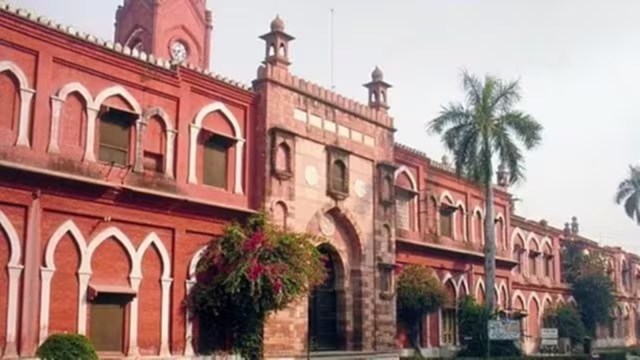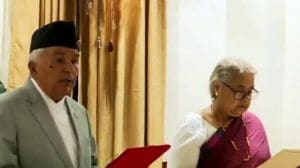The Supreme Court on Thursday said the 1981 amendment to the Aligarh Muslim University Act of 1920 stopped short of conferring complete minority character on the varsity and did not go beyond the 1951 amendment to the Act that had reduced the role of the Muslim community in AMU.
Chief Justice of India D Y Chandrachud, presiding over a 7-judge constitution bench, made the observation on a reference that arose from the 2006 verdict of the Allahabad High Court, which held that AMU which was established in 1920 was not a minority institution. The bench reserved its verdict on the minority status of AMU.

“A thing that is worrying us is that the 1981 amendment does not restore the position as it stood prior to 1951. In other words, the 1981 amendment does a half-hearted job. I can understand if the 1981 amendment said ok we are going back to the original 1920 statute, confer complete minority character… They were placating that sentiment but when it actually came to the brass stacks, they didn’t go back to the positions prior to 1951. And what it did was it brought the Muslim voice into AMU’s administration. As we see it, in the court for instance but it still stops short. Even Parliament, which had the power to do it, still stops short of taking us back to the 1920 Act… They made a few concessions but they never took it back to its pre-1951 position,” the CJI said.
Story continues below this ad
The bench, also comprising Justices Sanjiv Khanna, Surya Kant, J B Pardiwala, Dipankar Datta, Manoj Misra and Satish Chandra Sharma, was hearing the matter for the eighth day on Thursday.
The comments came as Senior Advocate Rajeev Dhavan, appearing for AMU, took the court through the Act and amendments to buttress his case that the university was established and administered by the Muslim community, thereby making it a minority institution under Article 30 of the Constitution, which deals with the right of religious and linguistic minorities to establish and administer educational institutions.
In 1967, a five-judge SC bench had in the case S Azeez Basha vs Union of India held that AMU was not entitled to minority education institution status as it was neither established nor administered by the Muslim minority. It was held that it was established by an Act of the British Parliament and not by the minority community. AMU contends that the decision in the Basha case is incorrect and has urged the SC to revisit the same.
The 1981 amendment was intended to undo the effect of the 1967 judgment. But in 2006, the Allahabad High Court struck down the 1981 amendment holding it & unconstitutional.
Story continues below this ad
While Dhavan pointed to the representation of Muslims in the administration of AMU, the Centre and others opposing the university’s minority status claim pointed out that the 1951 and 1965 amendments to the Act further reduced the role of the Muslims in it.
The substantial change, they pointed out, was to the proviso to Section 23(1) of the 1920 Act, which requires that all the members of the AMU court would only be Muslims. The proviso was deleted. Thus by the said amendments, Non-Muslims could also become members of the Court, they contended.
Referring to this, the CJI told Dhavan that even if the court was to grant his request to strike down Basha, the 1951 and 1965 amendments would still remain as they were never challenged.
“Let’s assume everything is in your favour, that we uphold that Basha is wrongly decided… even so that the amendments which were made in 1965, they do not get obliterated from the Statute books… that’s an independent exercise of Parliament’s legislative power. We will have to then say that because Basha was wrongly decided on establishment, there was a challenge to the constitutional validity of the 1951 and 1965 amendments before Basha…which was not decided. Now we have to decide it today in the absence of any challenge before us. If we don’t decide it as we possibly cannot after 65 years that means those amendments in 1951 and 65 continue to hold the field today,” CJI Chandrachud pointed out.
Story continues below this ad
Dhavan said that if the court were to hold the statutory intervention part of Basha as incorrect, then some of these amendments are invasive. He also pointed out that the AMU ordinance, which became the Act of 1965, was a temporary provision to tide over the difficult situation which was prevalent in the university at that time and the intention was to bring before Parliament in due course a comprehensive long-term legislation.
Dhavan contended that the 1981 amendment restored the minority character of AMU. Senior Advocate Kapil Sibal, appearing for AMU Old Boys Association, said the test to be applied is not the numerical one. The right under Article 30 accrues to me is the right to administer the institution as I please of my choice. I don’t think any minority institution in this country is administered by minorities. You apply the wrong test, you get the wrong answer.
Citing the instance of St Stephen’s, he said. How many teachers are minority? Not even 5%, administration 5%….what’s the relevance? This whole numerical argument is irrelevant to Article 30.
He said the SC’s 11-judge bench in TMA PAI Foundation & Ors vs State Of Karnataka & Ors had laid down the 4 tests as to what constitutes administration. The right to establish and administer broadly comprises the following rights: (a) to admit students b) to set up a reasonable fee structure (c) to constitute a governing body (d) to appoint staff (teaching and non-teaching) and (e) to take action if there is dereliction of duty on the part of any employee, he said.










